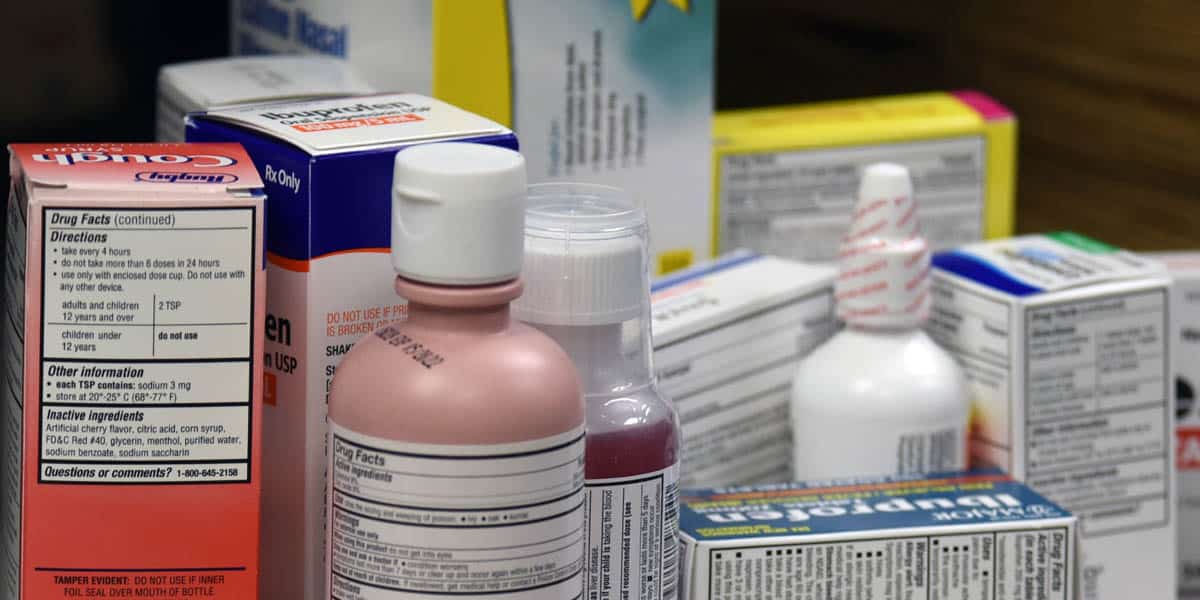28 OTC Medications to Stockpile (Prepper Medicine List)


[ad_1]
First aid is one of my passions. I like knowing that I’ll be able to act during a medical emergency, even if a doctor is not available.
But there is only so far that knowledge can take you. At some point, you are going to need medications to treat an ailment – which is why it is so important to stockpile OTC medications in case of an emergency.
Because there are so many different types of non-prescription medications you could include in your emergency kit, I’ve decided to break them down by purpose. Then I’ll give suggestions as to which OTC meds fulfill this purpose.
Pain and Fever Medicines:
When it comes to pain relief and fever reduction, the main options are:
- Acetaminophen (Tylenol) – Buy here
- Acetylsalicylic acid (Aspirin) – Buy here
- Ibuprofen (Motrin, Advil) – Buy in bulk here
There are actually a lot of differences between these OTC meds. For example, aspirin is a great anti-inflammatory but can cause digestive issues. Tylenol isn’t as good at relieving existing pain but is safer for children. Ibuprofen is my go-to for fever reduction, but not as strong as aspirin for relieving pain.
In addition, I’d also add these OTC pain relievers to the list of items to stockpile:
- Benzocaine (Orajel): Great for tooth pain – Buy Here
- Naproxen (Aleve): Good for headaches and inflammation – Buy Here
Diarrhea and GI Meds:
When emergencies occur, such as hurricanes and flooding, GI problems are very common. They occur because of contact with contaminated water.
To prevent this, it is very important that you know how much water to stockpile and have a reliable water purification method.
In case GI problems do occur, you’ll want these OTC medications stockpiled:
- Pepto Bismol: This is great go-to medicine for nausea, diarrhea, heartburn, indigestion, and upset stomach in general.
- Imodium: This medication stops diarrhea in its tracks. Now, you don’t always want to stop diarrhea (it is your body’s way of naturally getting rid of pathogens). However, diarrhea can be deadly, and there are times that warrant Imodium.
- Electrolytes (aka Rehydration Salts): I keep a huge stockpile of electrolytes in my first aid kit and always take them with me into the wilderness. They work to quickly rehydrate you, such as after severe vomiting or diarrhea. Since dehydration can kill, they are essential!
Wound Care Medications:
It is essential that you know how to treat a wound. Even small wounds can lead to serious infections if not treated properly!
I suggest you read these posts about How to Treat a Knife Wound and How to Treat Burns.
To prevent infection and speed healing, you’ll need:
- Burn cream – Buy here
- Antibiotic or antibacterial ointment (such as Neosporin) – Buy here
- QuickClot: Available as a coated gauze (powders are no longer recommended), QuickClot acts as a hemostatic agent to quickly stop bleeding on larger wounds.
Cold and Flu Medications:
A cold or flu usually isn’t a life-or-death matter. However, if SHTF and no doctor is available, a simple flu could be deadly.
You’ll want to make sure you have some fever meds (such as Ibuprofen) on hand to reduce temperature, as well as these OTC meds for relieving symptoms.
- Cough syrup (or make your own)
- Cough drops
- Vapor rub
- Decongestants (such as pseudoephedrine)
Skin and Allergy Meds:
We all know how important it is to bring anti-itch creams when going outdoors (my youngest kid always seems to trample through a patch of poison ivy!).
However, skin and allergy meds are equally important for your at-home emergency kit.
During natural disasters, your skin might come in contact with many hazardous substances. There are chemicals from nearby factories, pathogens in sewage-tainted water, and even the risk of flotillas of stinging fire ants!
To protect yourself (and avoid a lot of discomfort), be sure to stockpile:
- Oral antihistamines: Good options include diphenhydramine (Benadryl), Loratadine (Claritin), cetirizine (Zyrtec), and Fexofenadine (Allegra)
- Anti-itch creams: Contain antihistamines, steroids, and/or an anesthetic. If you aren’t sure which is right, please read this article about types of anti-itch creams.
- Fungal creams: For fungal infections like athlete’s foot and yeast infections, you’ll want OTC meds like clotrimazole, miconazole, and butenafine hydrochloride.
- Epi-Pen: Absolutely stockpile this if you have serious allergies. Unfortunately, Epi-Pens do expire quickly, so it can be quite costly to keep a stockpile.
Antibiotics:
Antibiotics are usually prescription-only. However, there are some ways to get around this. Some preppers talk to their doctors and are able to get a prescription for “just in case” antibiotics.
If your doctor won’t give you antibiotics for stockpiling, there are these OTC options (Disclaimer: Use at your own risk!):
- Fish antibiotics – read about how to use fish antibiotics for humans
- Natural antibiotics – Oil of oregano, goldenseal, garlic, and berberine are good choices. Read about natural antibacterial plants
- Homemade penicillin – read how to make penicillin here
Other OTC Medications to Stockpile
- Saline Solution: Good for cleaning out sinuses, wounds, and eye irrigation
- Laxatives: The sudden change in diet during an emergency can lead to terrible constipation. Laxatives will be welcome!
- Activated Charcoal: Consume in event of poisoning. Also good for GI ailments. You can also make your own activated charcoal.
- Sleeping Pills: OTC sleeping pills can be used during emergencies to help counteract anxiety and stress. I wouldn’t ever recommend them for long-term use though.
- Immunity-Boosting Supplements: Some great examples are vitamin C, zinc, colloidal silver, echinacea, ginseng, and probiotics.
- Potassium iodide tablets: These act as thyroid blockers to protect you against radiation poisoning. If you live near a nuclear facility, these should be in your emergency kit!
Want to learn more? Here are some resources on first aid for disaster preparedness:
[ad_2]
Source link
Recent Posts
Dear Diary, It’s Me, Jessica: Part 16
[ad_1] If you're new here, you may want to subscribe to my RSS feed. Thanks…
Google Faces Lawsuit After $5M in Crypto Stolen via Play Store App
[ad_1] A Florida woman, Maria Vaca, has sued Google in a California state court, alleging…
All About Water Purification: A Complete Tutorial
[ad_1] You may need to purify water to make it safe to drink. The process…
Protocol Village: Quai Releases Mainnet-Compatible Devnet, Crunch Lab Raises $3.5M
[ad_1] The latest in blockchain tech upgrades, funding announcements and deals. For the period of…
The Grim New Daily Life in Venezuela
[ad_1] If you're new here, you may want to subscribe to my RSS feed. Thanks…
World’s 3rd largest public pension fund buys $34M MicroStrategy shares
[ad_1] The third-largest public pension fund in the world has just bought nearly $34 million…
